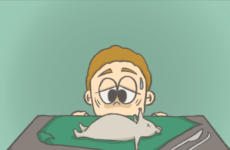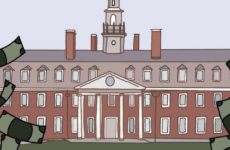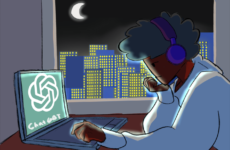As I’ve spent my time at Choate, I, like so many, have danced the silent dance of perpetuating sexual assault. I begin the dance by jamming thick, heavy earplugs into my ears. This layer of padding silences the deafening noise of sexual assault that pervade my surroundings. “I’m a feminist,” I mumble, sticking the plugs deeper into my ears. “I would never propagate rape culture,” I assure myself, as the sounds of patriarchy grow faint, succumbing to my devices. Contented, I skip along in my ignorance, unaware that avoiding the music doesn’t undo the dance.
In reality, as I walk about, the rhythms of sexual assault – songs taught to me by sexism since birth – course through me, forcing me to dance despite my best efforts. Blind to this truth, I’ve danced and danced, self-righteous and self-deceived. However, this cycle of unawareness has been punctuated by brief and shocking moments of clarity, the most recent of which took place last Friday.
Halfway through Now That We’re Men, Nick, played by Fred Heschinger, hunched over the PMAC stage, broke the fourth wall, and shook me loose of my obliviousness. His boyish crush on Rebecca and his upbeat personality disarmed me, and I began to empathize with and relate to Fred. He described himself as a docile guy and as a feminist, the same buzzwords I used to justify ignoring culture of sexual assault. I grew comfortable and let his words seep through my armored ears until I developed an amused, even fraternal impression of Fred. This was the impression I held at the end of the show, as the house lights came on and Fred admitted to having raped Rebecca.
I wished I could have been anywhere else. I felt exposed and vulnerable; I retreated from the edge of my seat in cowardice. The ending left me coverless, forced to evaluate my almost immediate identification with a rapist. My carefully guarded ears were left bare, and in all their bareness, I could understand the awe-inspiring power of the plays SLUT: The Play and Now That We’re Men.
I am still struck by how strongly I identified with certain characters and plot points; undoubtedly, the plays’ brilliance lies in their uncommonly accurate and relatable depiction of a toxic subculture. In thinking of how ubiquitous these sexual experiences in the play are, I reflect on the first SAC dance of freshman year.
Coming from a conservative and sheltered background, I had no experience or familiarity with sexual intimacy or with any system of impersonal, casual hookups. I observed that night that many of the same dangerous social dynamics with which characters in SLUT and Now That We’re Men grapple. In particular, I witnessed the infectious hypermasculinity that drives both male students and characters in the plays to view sex as a conquest. As my dorm mates and I reclined in exhaustion after the SAC dance, we and our prefects indulged in who-danced-with-whom stories and kept an unspoken tally of “successes” from the night. Those who recounted exaggerated (or even falsified) stories of brave interactions with girls were met with praise and admiration. Conversations like these not only perpetuate the notion that men should pursue their own pleasure before anyone else’s but also mirror the destructive interactions in Now That We’re Men. While I can only speak to my privileged experience as a man in a culture of sexual assault, many women with whom I’ve spoken have affirmed that their experiences also mirror those of the characters in SLUT.
Reconsidering our position within this culture will have a positive effect on our community. As more Choate students view their actions through the slightly dramatized lenses of SLUT and Now That We’re Men, the number of unwitting propagators of dangerous practices will decrease. The proof for this assertion was the breathless, taut energy of the PMAC auditorium on Friday; the mouths of shocked audience members left ajar; the furrowed brows reevaluating their inextricable role in maintaining coercive or unhealthy practices. Surely, the campus air felt different on my walk back from the arts center Friday night, and this change will manifest itself in the number of people who fight their tendency to begin the comfortable and silent dance of perpetuating a culture of sexual assault.




